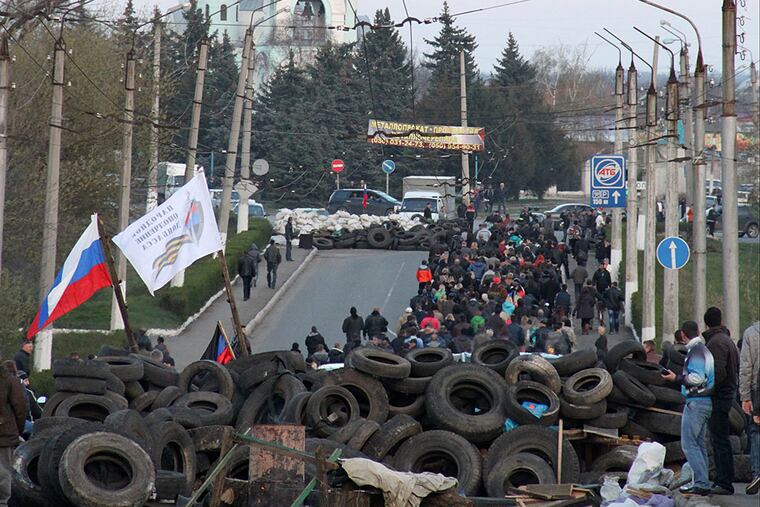Ukraine sends troops to face Russian sympathizers
DONETSK, Ukraine - The Ukrainian military on Tuesday secured an airfield threatened by Russian sympathizers, signaling the start of a campaign to counter militants who have stormed official buildings in at least 10 eastern cities.

DONETSK, Ukraine - The Ukrainian military on Tuesday secured an airfield threatened by Russian sympathizers, signaling the start of a campaign to counter militants who have stormed official buildings in at least 10 eastern cities.
After days of a cautious response and empty ultimatums, the government's deployment of troops on Tuesday could signal an escalation of the crisis, which is playing out much like the events that led to Crimea's annexation by Russia early this year.
Officials in Moscow have sternly warned against using force to deter what they say are "self-defenders" who are acting to protect the interests of ethnic Russians in Ukraine's east. Too strong a response, officials in Kiev and Western capitals have wagered, could be used by Russia as a pretext to send its troops spilling over the border.
Fanning those fears ahead of four-party talks set to start within 48 hours in Geneva, Russia on Tuesday slammed the Ukrainian government for waging "war" against its own people. In a sharply worded statement, the Foreign Ministry in Moscow accused Kiev of violently suppressing peaceful protests "with complete disregard for the legitimate interests of the population in the south east" of Ukraine.
The White House stood by Ukraine's response.
"The Ukrainian government has a responsibility to provide law and order, and these provocations in eastern Ukraine are creating a situation in which the government has to respond," White House press secretary Jay Carney said.
The government in Kiev appeared to show a new if tempered willingness to back up its pledge in recent days to restore order. On Tuesday, witnesses reported heavy gunfire as a Ukrainian jet tried to land at an airfield in Kramatorsk, a city 10 miles south of Slovyansk, where pro-Russian forces set up roadblocks Saturday.
Shortly afterward, Ukrainian troops were ferried to the site by helicopter, landed and encountered a hostile reception by protesters. What followed, officials and witnesses said, was a tense standoff in which the troops repeatedly opened fire to push protesters back beyond the perimeter fences.
It remained unclear whether the area was fully or temporarily secured. But acting President Oleksandr Turchynov described the move as part of a staged "counterterrorism operation" against pro-Russian separatists in the northern part of the Donetsk region.
"Soon there will be no terrorists left in Donetsk or any other region," Turchynov vowed in the parliament on Tuesday. "They will sit in prison, their proper place."
Stanislav Rechinsky, Ukraine's minister of internal affairs, told reporters in Kiev that there had been no fatalities during the operation by Ukrainian special forces at the airfield. Witnesses said that crowds of pro-Russian activists had roughed up a commander in the area who approached them after the airfield was supposed to be secured and that they remained on the airfield's edge, hurling verbal abuse at military officials.
"The aim of the operation was to avoid casualties among our people, and it is also desirable to save the lives of the separatists, because some of them are our citizens," Rechinsky said.
In contrast to Ukraine's official statements, however, Russian state television reported that between four and 11 people had been killed in the operation. Russia's Interfax news agency quoted a pro-Russian militiaman as saying that fighters from Ukraine's ultranationalist Right Sector movement and foreign mercenaries were involved in storming the airfield.
The divergent accounts illustrated the gap between Kiev and Moscow as the crisis appeared to be deepening.
On Tuesday, Ukrainian officials and witnesses reported a continuing buildup of their forces not far from Izyum, a city near the border of Kharkiv and Donetsk provinces in the east. Izyum is 32 miles northwest of Slovyansk, which Ukrainian forces failed to retake from well-armed pro-Russian activists Sunday in an operation that left two people dead.
An Izyum official involved in the mobilization, who spoke on the condition of anonymity, said the city was being used as a fueling and feeding station for Ukrainian troops, who began arriving over the weekend and were taking up positions outside the city limits.
Journalists reported seeing columns of armored personnel carriers and buses moving toward Slovyansk. But Rechinsky denied that the Ukrainian military had moved into the city, suggesting that the government remained leery of a full-on confrontation with pro-Russian forces, some of whom are heavily armed with weapons similar or identical to those used by the Russian military. Instead, the government focused on further attempts to defuse the situation in Slovyansk and elsewhere through negotiations.
"In Slovyansk, there is no equipment, no troops, although there are many panicked reports in the media about the movement of tanks, armored personnel carriers and so on," Rechinsky said.
In recent days, Turchynov first vowed to rout the protesters by force, then held out the possibility of a referendum to decide Ukraine's fate. But so far, nothing has appeared to move the militants to surrender.
There is deep uncertainty about the technical ability of Ukraine's underfunded and demoralized military to respond to pro-Russian forces, who Ukrainian officials say are being guided and perhaps supplied by Russian military commanders.
Turchynov told parliament on Tuesday that the effort to quell the rebellion in the east would "go on gradually, responsibly and prudently."